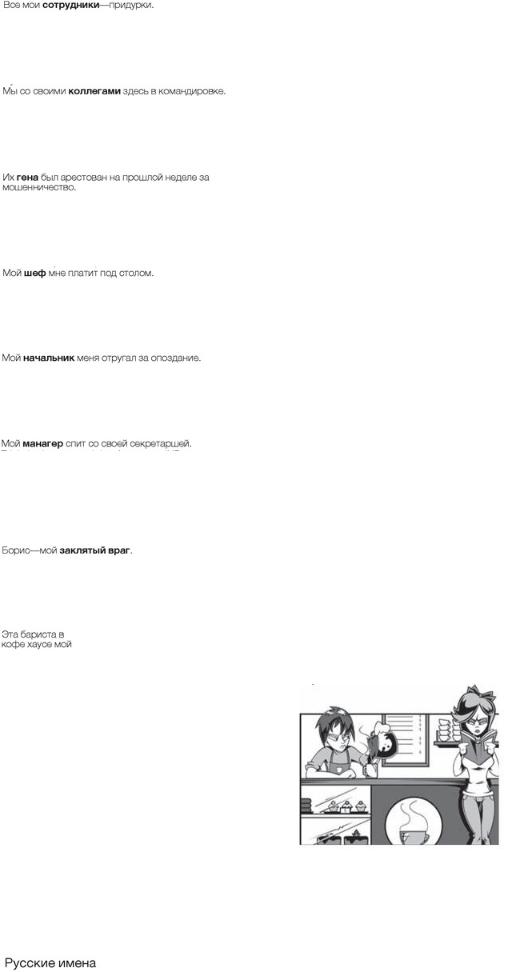
Dirty Russian Slang - Everyday Slang
.pdf
I don’t know what’s wrong with me. ya nye ZNA-yu, chto so mnoi.
I’m such an idiot. ya tak-OI i-di-OT.
It’s all my fault.
ya vo vsyom vi-no-VAT.
Don’t be upset with me! nye o-bi-ZHAI-sya!
I frickin’ swear I didn’t do it on purpose!
BLYA BU-du, ya nye spye-tsi-AL-no!
Let’s roll!
AI-da!
Russians aren’t known for being in a hurry, and parties, casual meetings, and even chance encounters can quickly become long, drawn out, and downright tiresome. Here a few verbal cues to let your friends know that you’re ready to make a getaway.
Bye! ko-KA!
See ya later! do VSTRYE-chi!
See ya soon! do SKO-ro-vo!
Kiss, kiss! tsium, tsium!
Don’t be a stranger! ne pro-pa-DAI!
Ciao!
chau!
It’s time for us (to go)! nam po-RA!

I’m off!
ya po-SHOL!
Let’s fucking bail already! po-PIZ-di-li u-ZHE!
It’s time for me to get the fuck outta here. mnye po-RA sye-BAT-sya.
 .
.
It’s getting kinda late.
u-ZHE ne-DYET-sko-ye VRYE-mya.
I’ll call you.
ya te-BYE po-zvo-NIU.
Hey, you!
eh, ti!
Sometimes you just want to give a shout out to someone you see on the street. Here are some quick ways to get their attention.
Hey...! eh...!
little girl
DYE-voch-ka
This is generally used for a girl up to about age 12 or so.
young man mo-lo-DOI che-lo-VYEk
This can be used for any guy up to about age 30.
miss
DYE-vu-shka
This is for females up to about age 30.
ma’am
ZHEN-schi-na
For women over 30 or so.
lady
BA-rish-nya
grandma
BA-bu-shka
For old ladies; just try to resist the American urge to say ba-BU-shka. It’s BA-bu-shka, dammit.

granny ba-BU-lya
Also for old ladies, but probably somewhat more common in small towns and villages.
gramps dye-DU-lya
old man sta-RIK
pal pri-YA-tyel
buddy dru-ZHOK
comrade to-VA-risch
Mainly used by old communists and ironic young people.
citizen gra-zhda-NIN
This is pretty Soviet sounding but still occasionally used.
guys re-BYA-ta
homey pa-TSAN
bro bra-TAN
dude chu-VAK
Russian doesn’t make very wide use of titles. When Russians want to address someone formally, they use the name and patronymic formula (you know, like  ) instead of Mister, Ms., etc. When titles are used, it is mainly with foreigners who expect that sort of thing. Also, most foreign names don’t lend themselves well to Russification and end up sounding pretty silly when you try. So for those occasions:
) instead of Mister, Ms., etc. When titles are used, it is mainly with foreigners who expect that sort of thing. Also, most foreign names don’t lend themselves well to Russification and end up sounding pretty silly when you try. So for those occasions:
Mister go-spo-DIN
Ms. go-spo-ZHA
In formal public speeches, you may also sometimes hear:
Ladies and gentlemen!

DA-mi i go-spo-DA!

CHAPTER 2
FRIENDLY RUSSIAN
DRU-ZHE-SKII RU-SSKII
In the U.S., we tend to call just about everyone we know our “friends.” Russians are not nearly so casual about relationships, however. To them a friend is someone who has been through thick and thin with you, someone who would share his last beer with you and bail you out of jail. For all those other people that you just hang out with, there are different words to describe the more casual nature of your relationship.
Friends
dru-ZYA
You’re a good friend (male/female)
ti kho-RO-shii drug/kho-RO-sha-ya po-DRU-ga.
 .
.
He is my very best friend in the world. on moi SA-mii LU-chshii drug v MI-rye.
Me and my buddies usually go shoot the shit after work.
mi so svo-I-mi pri-YA-tel-ya-mi o-BI-chno KHO-dim po-pi-ZDYET PO-sle ra-BO-ti.
This is a friend of a more casual nature, someone you just shoot the shit with.
Hey, homies, let’s party!
eh, pa-tsa-NI, da-VAi po-tu-SU-yem-sya! 
Dudes, let’s go for a beer. mu-zhi-KI, poi-DYOM za PI-vom.
My (high school) classmate always uses a crib sheet.
moi od-no-KLA-ssnik vsye-GDA i-SPOL-zu-yet shpar-GAL-ku.
He’s my (college) classmate at the uni.
on moi od-no-KURS-nik v u-ni-VER-ye.
We’re roommates in the dorm.
mi so-SYE-di po KO-mna-tye v ob-SCHA-gye.

I saw my boyfriend last night with some ho.
ya vch-RA VI-dye-la svo-ye-VO boi-FREND-a s ka-KOI-TO BLA-dyu.
My girlfriend is coming over tonight to hang out.
mo-YA GYORL-frend se-VOD-nya pri-DYOT po-ob-SCHAT-sya.
Sometimes you might hear this shortened to  (GYOR-la).
(GYOR-la).
You’re the best lover (male) I’ve ever had.
ti SA-mii LU-chshii lyu-BOV-nik, ko-TO-rii u me-NYA kog-DA-LI-bo bil.
TERMS OF ENDEARMENT

vsyo VRE-mya, kog-DA o-NI BI-li zhen-A-ti, u nye-VO bil-A lyu-BOV-nitsa na sto-ro-NYE.
I just can’t seem to forget my old flame.
ya ni-KAK nye mo-GU za-BIT svo-YU bIV-shu-yu PASSI-YU .
I met my fiancée through the Internet.
ya po-zna-KO-mil-sya so svo-YEI ne-VYE-stoi CHE-rez in-ter-NET.
Russians use  for both “fiancée” and “bride” and жених for both “fiancé” and “groom.”
for both “fiancée” and “bride” and жених for both “fiancé” and “groom.”
My fiancé and I just registered at ZAGS.
mi s mo-IM zhe-ni-KHOM TOL-ko chto za-re-gi-STRI-ro-va-lis v ZAG-sye.
Couples in Russia are officially engaged once they’ve registered at this Soviet-style marriage hall. This is also where the civil ceremony takes place.
Acquaintances, coworkers, and enemies
zna-KO-mi-ye, so-TRUD-ni-ki, i vra-GI
Who is that guy?
chto za CHE-lik?
What’s that chick’s name?
kak E-tu dev-CHON-ku zo-VUT?
All broads are wenches.
vsye BA-bi—STYER-vi.
Hey, it’s just a song.
This acquaintance of mine once hitchhiked from Moscow to Irkutsk.
o-DIN moi zna-KO-mii od-NA-zhdi YE-khal av-to-STOP-om ot mosk-VI do ir-KUTSK-a.
I never give my phone number to strangers.
ya ni-kog-DA nye da-YU svoi NO-mer te-le-FO-na nezna-KOM-tsam .
 .
.
My coworkers are a bunch of morons.
vsye mo-I so-TRUD-ni-ki—pri-DUR-ki.

My colleagues and I are here on a business trip.
mi so svo-I-mi ko-LLYE-ga-mi zdyes v ko-mman-dir-O-vkye.
Their CEO was arrested last week for fraud.
ikh GYE-na bil a-rest-O-van na PRO-shloi nye-DYEL-ye za mo-SHE-ni-chest-vo.
My boss pays me under the table.
moi shef mnye PLA-tit pod stol-OM.
My supervisor cussed me out for being late.
moi na-CHAL-nik me-NYA ot-ru-GAL za o-po-ZDA-ni-ye.
My manager is sleeping with his secretary.
moi MA-na-ger spit so svo-YEI se-kre-TAR-shei.
This is the slangy pronunciation of  (ME-ne-dzher).
(ME-ne-dzher).
Boris is my mortal enemy.
bo-RIS—moi za-KLYA-tii vrag.
The barista at the coffee shop is my arch nemesis.
E-ta ba-RI-sta v KOFYE KHAU-sye moi ko-VAR-nii vrag.
 .
.
Russian names
RU-sski-ye i-me-NA
Russian is a very expressive language, especially when it comes to names. They are several ways to address people by name depending on the degree of formality and the range of feelings you want to show to that person. In formal situations (where you would use vy), you generally address the person by name and patronymic. The patronymic is formed by the person’s father’s first name plus–ovich for a guy and–ovna for a chick.

In very official situations, Russians will often be asked to give their  . (FIO), which stands for
. (FIO), which stands for  (fa-MI-liya-I-mya-OT- che-stvo): last name, first name, patronymic.
(fa-MI-liya-I-mya-OT- che-stvo): last name, first name, patronymic.
In more casual situations (one where you would use ty), usually the short version of the first name is used, and with close friends and loved ones, various diminutives will be used expressing a range of emotions.
For example, my daughter’s full first name is  (Miroslava). In formal situations, she would be called
(Miroslava). In formal situations, she would be called  (Miroslava Igorevna), her patronymic derived from her father’s first name, Igor. Informally, she could be called either
(Miroslava Igorevna), her patronymic derived from her father’s first name, Igor. Informally, she could be called either  (Mira) or
(Mira) or  (Slava).
(Slava).
There are numerous diminutives that can be used affectionately:
 (Mirochka),
(Mirochka),  (Mirusia),
(Mirusia),  (Mirusnya),
(Mirusnya),  (Mirunchik),
(Mirunchik),  (Mirusik),
(Mirusik),  (Mirusichka),
(Mirusichka),  (Mirusinka)
(Mirusinka)
Or, when she’s screwing around, she’s known pejoratively as:
Mirka
If I’m addressing her directly, I will call:
Hey, Mir!
This is something of a new vocative whereby the short form of a name ending in a loses its ending when you are directly addressing the person.
For a guy, it’s basically the same story. For example, my husband’s name is  (Igor). Formally, he would be
(Igor). Formally, he would be 
 (Igor Leonidovich), and affectionately he could be called
(Igor Leonidovich), and affectionately he could be called  (Igoryonia), or
(Igoryonia), or  (Igoryok).
(Igoryok).
All Russian names can do this, although there are some variations on endings depending on the name. But once you get the hang of it, you can really be as creative as you want—Russians certainly are!
Compliments
kom-pli-MYEN-ti
Even the gruffest of Russians can often be won over with a few kind words; however, they tend to be very sensitive to insincerity. So if you want to compliment a Russian, you better keep it real. Or better yet, follow it up with alcohol and chocolate.
You rock!
ti PRO-sto mo-lo-DYETS!
Molodyets is sort of an all-purpose compliment that can mean anything from “Good job” to “You’re a swell guy.”
Smartypants! ti UM-nich-ka!
That’s a helluva idea!
E-to SU-per-ska-ya i-DYE-ya!
That’s genius!
E-to ge-ni-AL-na-ya misl!

Cool threads!
KLASS-ni-ye SHMOT-ki!
I really dig...
ya PRO-sto bal-DYE-yu ot…
Note that this phrase is followed by the genitive case.
your groovy style.
tvo-ye-VO KLYO-vo-vo STIL-ya.
your rad hairstyle.
tvo-YEI o-bal-DYE-nnoi pri-CHO-ski.
your trendy jeans. tvo-IKH MOD-nikh JINS-ov.
your slick new murse.
tvo-YEI shi-KAR-noi NO-voi bar-SYET-ki.
In other words, a man purse.
your amusing (eye)glasses. tvo-IKH pri-KOL-nikh och-KOV.
You have awesome taste. u te-BYA o-fig-YE-nnii vkus.
You look really cool.
ti KLASS-no VI-glyad-ish.
You’re dressed real snazzy. ti a-TAS-no o-DYET.
You look fly in that dress.
ti KRU-to VI-glyad-ish v E-tom PLA-tye.
She’s a really cool chick.
on-A KLASS-na-ya dyev-CHON-ka.
He’s an awesome guy. on SLAV-nii PAR-en.
I envy you.
ya te-BYE za-VID-u-yu.
In Russian, there are two kinds of envy:  (BYELA-YA ZA-vist), or “white envy,” and
(BYELA-YA ZA-vist), or “white envy,” and  (CHORNA-YA ZA-vist), or “black envy.” White envy is the good kind of envy where ultimately you are genuinely happy for the person and their good fortune. Black envy, on the other hand, is the kind where you secretly wish the person would spontaneously combust right in front of you so that you could witness their suffering and death and then confiscate the object of your envy so that it can be yours, all yours.
(CHORNA-YA ZA-vist), or “black envy.” White envy is the good kind of envy where ultimately you are genuinely happy for the person and their good fortune. Black envy, on the other hand, is the kind where you secretly wish the person would spontaneously combust right in front of you so that you could witness their suffering and death and then confiscate the object of your envy so that it can be yours, all yours.
